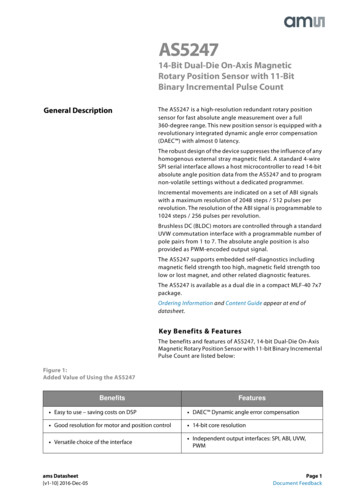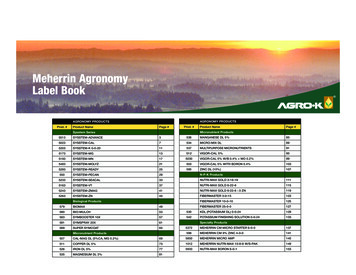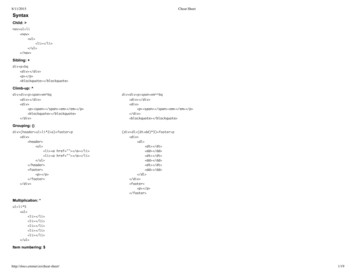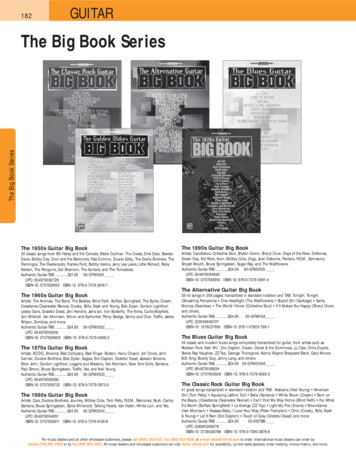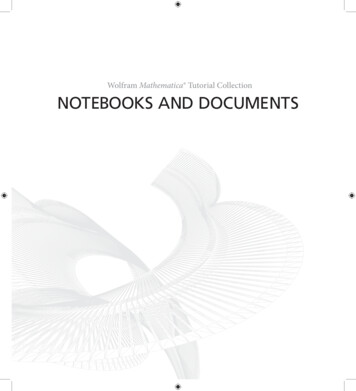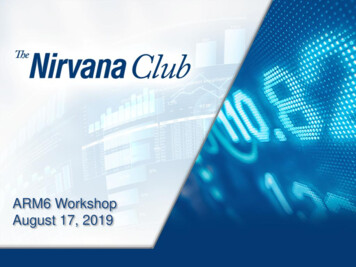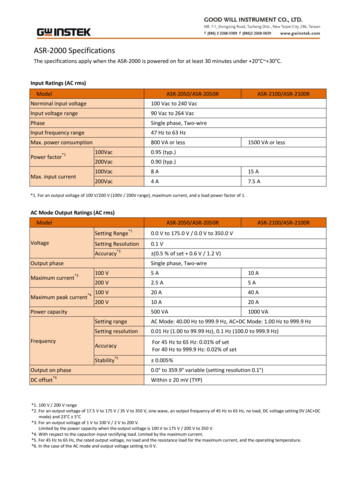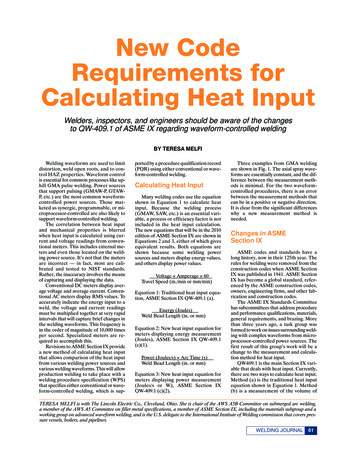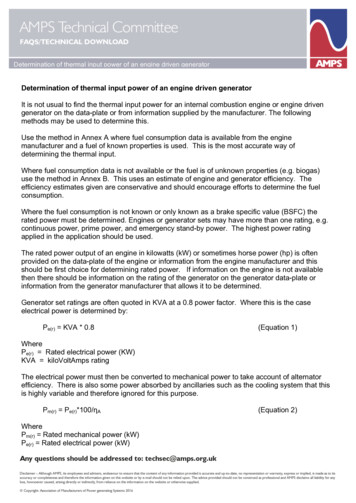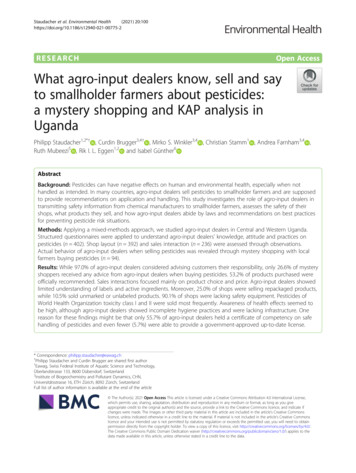
Transcription
Staudacher et al. Environmental Health(2021) SEARCHOpen AccessWhat agro-input dealers know, sell and sayto smallholder farmers about pesticides:a mystery shopping and KAP analysis inUgandaPhilipp Staudacher1,2*† , Curdin Brugger3,4† , Mirko S. Winkler3,4 , Christian Stamm1 , Andrea Farnham3,4 ,Ruth Mubeezi5 , Rik I. L. Eggen1,2 and Isabel Günther6AbstractBackground: Pesticides can have negative effects on human and environmental health, especially when nothandled as intended. In many countries, agro-input dealers sell pesticides to smallholder farmers and are supposedto provide recommendations on application and handling. This study investigates the role of agro-input dealers intransmitting safety information from chemical manufacturers to smallholder farmers, assesses the safety of theirshops, what products they sell, and how agro-input dealers abide by laws and recommendations on best practicesfor preventing pesticide risk situations.Methods: Applying a mixed-methods approach, we studied agro-input dealers in Central and Western Uganda.Structured questionnaires were applied to understand agro-input dealers’ knowledge, attitude and practices onpesticides (n 402). Shop layout (n 392) and sales interaction (n 236) were assessed through observations.Actual behavior of agro-input dealers when selling pesticides was revealed through mystery shopping with localfarmers buying pesticides (n 94).Results: While 97.0% of agro-input dealers considered advising customers their responsibility, only 26.6% of mysteryshoppers received any advice from agro-input dealers when buying pesticides. 53.2% of products purchased wereofficially recommended. Sales interactions focused mainly on product choice and price. Agro-input dealers showedlimited understanding of labels and active ingredients. Moreover, 25.0% of shops were selling repackaged products,while 10.5% sold unmarked or unlabeled products. 90.1% of shops were lacking safety equipment. Pesticides ofWorld Health Organization toxicity class I and II were sold most frequently. Awareness of health effects seemed tobe high, although agro-input dealers showed incomplete hygiene practices and were lacking infrastructure. Onereason for these findings might be that only 55.7% of agro-input dealers held a certificate of competency on safehandling of pesticides and even fewer (5.7%) were able to provide a government-approved up-to-date license.* Correspondence: philipp.staudacher@eawag.ch†Philipp Staudacher and Curdin Brugger are shared first author1Eawag, Swiss Federal Institute of Aquatic Science and Technology,Überlandstrasse 133, 8600 Dübendorf, Switzerland2Institute of Biogeochemistry and Pollutant Dynamics, CHN,Universitätsstrasse 16, ETH Zürich, 8092 Zürich, SwitzerlandFull list of author information is available at the end of the article The Author(s). 2021 Open Access This article is licensed under a Creative Commons Attribution 4.0 International License,which permits use, sharing, adaptation, distribution and reproduction in any medium or format, as long as you giveappropriate credit to the original author(s) and the source, provide a link to the Creative Commons licence, and indicate ifchanges were made. The images or other third party material in this article are included in the article's Creative Commonslicence, unless indicated otherwise in a credit line to the material. If material is not included in the article's Creative Commonslicence and your intended use is not permitted by statutory regulation or exceeds the permitted use, you will need to obtainpermission directly from the copyright holder. To view a copy of this licence, visit http://creativecommons.org/licenses/by/4.0/.The Creative Commons Public Domain Dedication waiver ) applies to thedata made available in this article, unless otherwise stated in a credit line to the data.
Staudacher et al. Environmental Health(2021) 20:100Page 2 of 19Conclusion: The combination of interviews, mystery shopping and observations proved to be useful, allowing thecomparison of stated and actual behavior. While agro-input dealers want to sell pesticides and provide thecorresponding risk advice, their customers might receive neither the appropriate product nor sufficient advice onproper handling. In light of the expected increase in pesticide use, affordable, accessible and repeated pesticidetraining and shop inspections are indispensable.Keywords: Attitude, Counterfeit, Highly-hazardous, Knowledge, Pesticide dealer, Practices, Registration, Retail, Riskcommunication, SmallholderBackgroundPesticides can have negative effects on human and environmental health, especially when not handled asintended. Smallholder pesticide use is increasing in lowand middle-income countries, and is often practicedwithout personal protective equipment (PPE) [1–3].Pesticide exposure can lead to acute symptoms likeheadache and respiratory distress, or chronic health effects, such as increased risk for cancer and cognitivehealth impairment [4, 5]. Examples of environmental effects include weakened honey bee immune systems, eggshell thinning in birds, and damage to reproductivesystems among amphibians and mammals [6].Agro-input dealers are small, often independent stockists or distributors of agricultural inputs, such as pesticides. The private retail sector, including agro-inputdealers, is often the dominant source of pesticides forfarmers in low- and middle-income countries [7]. Studies show that smallholders also consider agro-inputdealers a major source of information for pest management [2, 8]. Pesticide manufacturers, on the other hand,do not have direct contact with agro-input dealers andfarmers, and thus use written formats such as productlabels to inform their customers [9]. The label on apesticide container is intended to provide all relevant information on content and handling, as well as protectivemeasures to be taken for the environment and humanhealth [10]. Agro-input dealers are crucial in providingfarmers access to products with sufficient labelling,translating and transmitting the necessary information(to often illiterate farmers) and providing access torecommended tools and protective equipment wherenecessary [11].Despite agro-input dealers’ essential role in protectinghumans and the environment from the harmful use ofpesticides, only a few studies have investigated theirknowledge, the safety of their shops, and the advice theygive to their customers, including how they transmitsafety recommendations from the chemical manufacturers to the users. Some studies from low- and middleincome countries suggest that agro-input dealers are notinterested in providing proper advice, as this might reduce product sales [12, 13]. Other studies found thatagro-input dealers are not properly trained [14, 15] andbase their advice on knowledge gained through personalexperience, brand ambassadors, and level of commission[16, 17]. On the other hand, many studies suggest thatfarmers take the advice from agro-input dealers seriouslyand adopt the suggested practices [18–20]. The role ofagro-input dealers in pesticide risk advice is underlinedby the fact that farmers often prefer them as a source ofinformation over alternatives such as extension services[21] due to closer proximity and higher accessibility[14]. Unfortunately, the licensed shop owners are regularly absent from their agro-input shops and employ untrained staff instead, thus making proper customeradvice difficult [15, 22].Despite the abundance of agro-input shops selling potentially harmful chemicals, little is known about thesafety of the shops, the knowledge of the agro-inputdealers and the advice given to farmers. To fill this gapwe conducted a study among agro-input dealers inUganda. Previous studies have investigated farmers’pesticide use and related risks as well as information behavior in Uganda, identifying agro-input dealers as theprimary provider of pesticides and an information sourcefor smallholders on risk factors for safe pesticide use [2,3, 8, 23]. This study investigated what pesticides agroinput dealers sold, what safety advice they gave tofarmers, what they knew about pesticides and believedabout the risks, and how they are abiding by the laws,recommended guidelines, and best practices to preventpesticide risk situations in their own shops.MethodsTo compare stated with actual behavior of agro-inputdealers, this study combined three different data collection modules: i) mystery shopping (MYS) to observeagro-input dealers providing pesticide risk and safety advice to farmers through trained undercover observers; ii)knowledge, attitude and practice (KAP) interviews onsafe pesticide use and handling with sales staff workingin agro-input dealers shops, and iii) observations of shoppremises and sales interactions. The KAP interview aswell as sales and shop observations were conducted withthe complete sample, while only a sub-sample of 25%was selected for a mystery shopping before the KAPinterview (Fig. 1). KAP interviews were conducted with
Staudacher et al. Environmental Health(2021) 20:100Page 3 of 19Fig. 1 Distribution of study participants (own illustration, adapted from CONSORT flowchart [24]).AD: agro-input dealer; DAO: district agricultural officer. Reading explanation: Of the 479 agro-input dealers approached, 25 Shops were closed and50 agro-input dealers refused to take part in the study, resulting in 404 KAP interviews (310 94) that were started. 402 of the interviews werefinished and used for analysis. From 107 MYS conducted, ten MYS had to be excluded from analysis because the agro-input dealers refused totake part in the KAP survey. Additionally, three MYS could not be included in the analysis because the KAP survey was conducted with a differentstaff member than the MYS. 10 agro-input dealers refused the shop observation, thus 392 shop observations were conducted. At 236 shops asale observation took place because 156 agro-input dealers did not have any customers during the time the researchers were at their store orthey did not give consent. In one case, only a sale observation but no shop observation was conductedthe same person who sold the pesticide during the mystery shopping.Study setting in UgandaIn order to be allowed to sell pesticides, agro-input dealersin Uganda are required to complete eleven years of school(ordinary secondary school, Senior Four certificate),complete a certification of competency on safe handling ofpesticide (CCSP), and register their business with severalUgandan authorities [25]. The curriculum of the twoweek long training course for the certification of competency on safe handling of pesticide contains the relevantinformation a pesticide dealer should know about. Pestidentification and pest control measures (e.g. cultural control, integrated pest management) are as much part of theprogram as regulations, application practices, and equipment [26]. In 2009, a census in Uganda of 2064 agro-inputdealers found that only a minority had not completedmandatory school (12%), while less than half (45%) reported undergoing training for a certification of competency on safe handling of pesticide. However, 31%reported an academic specialization in the field of agriculture. The majority reported a trading license (85%), whileonly 27% were registered with the Ministry of Agriculture,Animal Industry and Fisheries [27].SampleThe study was conducted in 35 districts and 146 townsin the central and western region of Uganda in Octoberand November 2019 (Fig. 2). To ensure a representativesample, districts with high and low agro-input dealerdensity (estimated number of agro-input dealers peragricultural household from the corresponding officialnational agricultural census [28]), and with high and lownumber of registered agro-input dealers (share of selfreported registered agro-input dealers according to the
Staudacher et al. Environmental Health(2021) 20:100Page 4 of 19Fig. 2 Map of Uganda showing the 35 selected districts and corresponding study sites.A green point indicates that an agro-input dealer shop was identified and a KAP interview conducted. A yellow point indicates, that a KAP tookplace with a MYS in the same shop beforehandfirst and only national agro-input dealer census [27])were selected. Because of logistical considerations onlydistricts with a majority of the population speakingLuganda or Runyankore were included. To ensure at leastone open agro-input shop per town was present, the focuswas placed on larger towns. In each town agro-inputdealers were selected by a predefined process using a cointoss to maximize random selection.The agro-input dealer census from 2009 identified1588 agro-input dealers in the central and western region of Uganda [27]. Across the 35 districts and 146towns we approached 479 agro-input dealers to reachthe target sample size of 400 agro-input dealers, representing approximately 25% of the 2009 agro-input dealerpopulation. The KAP interviews and shop observationswere conducted in 146 towns (median: 7 per district),while the additional mystery shopping was conducted in65 towns (median: 3 per district) (Fig. 1). To ensure thatthe final sample was representative of the cultural andclimatic context of central and western Uganda, wepracticed stratified sampling for important agro-inputdealer characteristics, such as registration status andrural vs. urban settings.Data collectionMystery shopping is a form of covert participatory observation to gain a better understanding of the interactionbetween a seller and a customer [29]. A mystery shopperwho is trained by the researcher enters a store and acts asa typical customer in need of a product or service. Afteracquiring the product or service, the mystery shopper isinterviewed by a researcher, through which important information on the services in the respective store is gained[16, 30]. Outside of market research and customer serviceevaluation, mystery shopping is not yet widely used. A fewstudies have successfully applied mystery shopping in public health settings in Europe [31, 32] and Africa: Thestudies in Kenya [33] and Tanzania [30, 34] investigatedthe drugs sold and advice provided by drug retailers whenpresented with symptoms by a mystery shopper.For the mystery shopping technique to produce validand reliable data it is important that the mystery
Staudacher et al. Environmental Health(2021) 20:100shopper appears to be a plausible regular customer andthat all mystery shoppers follow the same protocol. Inthis study, we recruited local farmers and systematicallytrained them to describe the case problem with the samefour sentences. The case problem used was the fallarmyworm affecting the farmer’s maize. The fall armyworm was first noted in Africa in 2014 and has becomea devastating pest in sub-Saharan Africa, includingUganda [35, 36]. In the case where farmers were notgiven any advice before they had paid for the pesticide,they were instructed to ask three specific questions onhealth risks and protection. After completion of themystery shopping the farmers were debriefed about theirshopping experience and interaction with the agro-inputdealers, using a standardized structured questionnaire inODK (Open Data Kit) [37].KAP interviews are a well-established method tocollect a large amount of quantitative data fromstudy participants on self-reported knowledge, attitude and practices related to a specific field [38]. Inthis study, KAP interviews were conducted with astandardized structured questionnaire in Luganda,Runyankore or English. The KAP survey coveredknowledge, attitude and practices on their professionas agro-input dealers, handling and protection ofpesticides, effects of pesticides on human and environmental health, alternatives to pesticide use, and generalagricultural aspects. In addition, the interviews includedquestions on socio-demographics, education, training,sales experience, shop organization, and personal health.In parallel with the KAP survey, each interviewer alsoconducted two observations per interviewee: i) the dealer’ssale interaction with a customer; ii) the shop premises regarding compliance with official safety recommendations[25, 39]. Both the sale interaction and the shop premiseswere studied through a non-participatory, structured andovert observation. Refusal to take part in one or bothobservations did not exclude the dealer from the study.The research team was thoroughly trained for 10 daysand conducted a pilot study in one district, Wakiso. Thequestionnaires were translated from English to Lugandaand Runyankore by professional translators and refinedafter the pilot. Ethical clearance was obtained in Ugandaand Switzerland (see declarations).Page 5 of 19Data and analysisDescriptive statistics were estimated for all variablesusing R version 4.0.2 [40]. To assess whether the subsamples mystery shopping and sale observation weredrawn from the same distribution as KAP, we conducteda two-sample Kolmogorov–Smirnov test for each numerical variable, while for categorical variables we applied the chi-square test to test whether subsets differed.All prices were calculated from Ugandan Shilling toUnited States Dollar ( ), using the conversion rate ofOctober 2019 at 1:3700.The agro-input dealer shop observations were based onguidelines by both the Ministry of Agriculture, Animal Industry and Fisheries and the Food and AgricultureOrganization of the United Nations [25, 39]. The failureto adhere to these recommendations was categorized intothree increasing categories of seriousness, following thework of Akhabuhaya [41]: somewhat serious, serious andvery serious. These categories were selected to reflect therisk for acute intoxication through oral or dermal exposure (very serious), chronic intoxication through inhalation,or dermal exposure (serious), or otherwise not followingthe guidelines (somewhat serious).When comparing different pesticide products, their active ingredients, and their toxicity we use the toxicityclasses recommended by the World Health Organization(WHO) [42]. The WHO classifies pesticides based onacute oral and dermal toxicity of the AI, defining fiveclasses based on different LD50: Ia – extremely hazardous, Ib – highly hazardous, II – moderately hazardous,III – slightly hazardous, and U – unlikely to presentacute hazard (formerly class IV – Less hazardous)(Supplementary Table ST 1, Additional File 1).During the agro-input dealers’ knowledge assessment,the first set of questions referred to a typical safety label,which is normally placed on the bottom end of a pesticide container. The colored part, the two areas withsimilar symbols, as well as the individual symbols havedifferent meanings and are supposed to be read (andunderstood) from left to right (Fig. 3).For the attitude assessment, we adapted a battery ofstatements originally designed for smallholder vegetablefarmers in Southeast Asia [43]. The statements were determined to be disputed, when the absolute differenceFig. 3 Example label used for knowledge test. The image was provided without the text and numbers, see also Supplementary Table ST 2,Additional File 1. Image adapted from FAO and WHO [9]
Staudacher et al. Environmental Health(2021) 20:100Page 6 of 19between 50 and the share of answers stating ‘true’ or‘yes’ was smaller than 20 (Example: 10% Yes, not disputed: 50–10 20; 35% Yes, disputed: 50–35 20).Using a simple regression (linear for score-dependentvariables and logistic for binomial dependent variables)we analysed the relationship between the independentvariables age (years), education (years), sex (female/male), positon (owner/employee), having a certificationof competency on safe handling of pesticide (yes/no),having a shop license (yes/no), distance to Kampala(rounded to 100 km), distance to next city (roundedto 100 km) and the following dependent variables:knowledge of pesticide labels, product use and alternatives (score 1–10), pesticide beliefs (score 1–16),hygiene practices, wearing gloves and repackaging ofpesticides (score 1–12), very serious violation of lawsor recommendations (yes/no), selling pesticides ofclass WHO I and II during mystery shopping (yes/no)and providing any advice during mystery shopping(yes/no).The dataset, as well as the instruction materials andquestionnaires from the collection are accessible ide dealersOf the 479 agro-input dealers approached, we sampled107 shops for a mystery shopping, 402 for knowledge,attitude and practice interviews, 392 for shop observations, and 236 for sale observations (Fig. 1). The 402agro-input dealers interviewed were close to thirty yearsold (28.5 years), and the majority were women (60.7%).Roughly half of them were shop owners (53.0%), and halfof them employees (47.0%), with a median employmentin agro-input dealer shops of three years (equaling alsothe median experience in selling pesticides). Agro-inputdealers in Uganda worked on average twelve hours perday, seven days a week, and earned 54.1 per month(Table 1). The majority of agro-input dealers (83.3%)had completed mandatory school (seven years primaryTable 1 Sample description for agro-input dealers, their education and trainingAgro-input dealersUnitKAPaOBSaMYSaNumber of participantsn40223694Female (vs male)%60.761.062.8Age (medianb)years28.5 (6.7)29 (7.4)29 (7.4)Employees (vs owners)%47.044.543.6Employment in this shop (medianb)years3 (3.0)3 (3.0)3 (3.0)Working hours per day (medianb)n12 (1.5)12 (1.5)12 (1.5)Working days per week (medianb)n7 (0)7 (0)6 (0.7)Monthly income from shop (medianb) 54.1 (40.1)54.1 (40.1)54.1 (40.1)Responsibilities around pesticides in the shop (multiple choice)Responsible for everything (see below)%76.174.275.5Conducting sales%23.925.9024.5Giving advice%20.923.319.1Handling aning%17.719.914.9(Re)packaging%6.977.68.5General Education (medianb)years13 (3.0)13 (3.0)13 (3.0)Experience selling pesticides (medianb)years3 (3.0)4 (3.0)4 (3.0)%55.764.8***61.7on pesticides in general%77.974.676.6in alternatives to pesticides%43.846.245.7in pesticide application%90.390.788.3cInterviewee has a CCSPEver received any training Note: No significant differences were found with one exception: CCSP is different between KAP and OBS: ***Significant difference at p 0.001aThe samples are abbreviated with KAP for the full sample of interviewees, MYS for those participating in mystery shopping and OBS for those participating in thesales observationbMedian with median absolute deviation in parenthesescCCSP: Certification of competency on safe handling of pesticide
(2021) 20:100Staudacher et al. Environmental HealthPage 7 of 19and four years secondary) or more. Of all agro-inputdealers, 29.3% had a higher education in agriculture, veterinary, pharmacy or medicine, whereas 19.7% weretrained in business, administration, accounting, etc.(Supplementary Table ST 3, Additional File 1).The majority of agro-input dealers (76.1%) were responsible for everything in the shop, while the otherswere mainly responsible for conducting sales (23.9%)and giving advice (20.9%) (Table 1). Only 55.7% of theinterviewed agro-input dealers held a certification ofcompetency on safe handling of pesticide, a requirementto sell pesticides in Uganda. But more than 90.3% hadreceived instructions on pesticide application and 77.9%had received another general training on pesticides(Table 1). The contents of the general pesticide trainingwere primarily safe use and handling of chemicals(86.9%) (Supplementary Table ST 4, Additional File 1)and were provided by either the Uganda National AgroInput Dealers’ Association (UNADA), the shop owner, agovernment agency, or schools and university; agricultural extension services and pesticide manufacturersplayed a less important role. On the other hand, lessthan half of agro-input dealers had ever received trainingon alternatives to synthetic pesticides, while 38.1% ofthose agro-input dealers who had, received it in schoolor university (Supplementary Table ST 5, Additional File1). The sample does not show indications of imbalancesbetween the main sample for KAP and the subsamplesfor sales observations and mystery shopping.Pesticide shopsThe majority of agro-input shops (82.3%) reported atleast one employee with a certification of competencyon safe handling of pesticide (Table 2) and had beeninspected at least once in the past (81.1%), mostly tocheck for counterfeits or other unauthorized products(36.8%), or license approval or renewal (30.6%). A shoplicense issued by the Ministry of Agriculture, AnimalIndustry and Fisheries is mandatory to sell pesticides inUganda. However, only 5.7% of shops could provide anup-to-date license, while 41.5% stated they had nolicense (Supplementary Table ST 6, Additional File 1).Each shop has a median estimate of 20 customers perday, half of which buy pesticides for a median price of 4.1. The customers are primarily smallholder farmers(90%), male (70%) with a median farm size of one acre(Table 2).The shop observation revealed that 100% of shopsshowed somewhat serious, 98% of shops serious, and 36%very serious deviations from the shop setup recommended by both the Ministry of Agriculture, AnimalIndustry and Fisheries and Food and the AgricultureTable 2 Sample description for shops and customersShop organization and customer relationsUnitKAPaOBSaMYSaAt least one person with CCSPc working in shop%82.388.6***87.2Number of employees per shop (median )n2 (1.5)2 (1.5)2 (1.5)Sole ownership (vs partnerships or cooperatives)%87.889.087.2Owner regularly interacting with customers%88.892.4*92.6At least one shop employee visiting farmer fields%68.769.963.8bb2Estimated shop size (median )m9 (7.4)9 (7.4)9 (7.4)Shop age (medianb)years4 (2.97)4 (2.97)4 (2.97)Open days per week (medianb)n7 (0)7 (0)6.5 (0.7)Customers per day (median) bn20 (14.8)20 (14.8)20 (14.8)bNumber of pesticide transactions per day (median )n10 (7.4)10 (7.4)10 (7.4)Spending on pesticides per transaction (medianb) 4.1 (4.0)4.1 (4.0)4.1 (4.0)Number of customers per season (medianb)n1680 (1068)1920 (1423)1680 (1328)Number of competitors in parish (medianb)n5 (4.5)6 (4.5)7 (5.9)Share of non-smallholder customers (medianb)%10 (14.8)15 (19.3)10 (14.8)Share of female customers (medianb)%30 (14.8)30 (14.8)30 (14.8)Customer farm size (medianb)acre1 (0.7)1 (0.7)1 (0.7)Customers with smartphone (median shareb)%20 (22.2)20 (22.2)25 (22.2)Note: No significant differences were found with two exceptions: CCSP is different between KAP and OBS: ***Significant difference at p 0.001 and owner interaction forOBS *Significant difference at p 0.05aThe samples are abbreviated with KAP for the full sample of interviewees, MYS for those participating in mystery shopping and OBS for those participating in thesales observationbMedian with median absolute deviation in parenthesescCCSP: Certification of competency on safe handling of pesticide
Staudacher et al. Environmental Health(2021) 20:100Organization of the United Nations [25, 39]. Very seriousdeviations were found in a quarter of shops that were repackaging pesticide containers (25.0%) and a tenth ofshops that were using unmarked/unlabeled pesticidecontainers (10.5%). The serious deviations were lack ofsafety equipment (90.1%), such as PPE, water, soap, ormaterials for spill-cleanup such as brooms. Also prominent were obstructed fire exits (41.6%), insufficient ventilation (31.1%), and small shop sizes (41.1%). Moreover,somewhat serious deviations like the absence of safetydisplays (99.7%), missing firefighting equipment (93.4%),absence of documents (85.7%), or inadequate floordrainage (78.8%) were frequently observed (Supplementary Table ST 7, Additional File 1).Agro-input dealers were commonly not using PPEwhen handling pesticides in the shop. The most accessible PPE (to more than 69%) were also the most used(by more than 30% of those who had access): Maskswithout carbon filter, long sleeved shirts, gloves, longpants, and rubber boots (Supplementary Fig. SF 1, Additional File 1). The reasons agro-input dealers gave as towhy they weren’t using PPE were lack of availability(43.3%), high price (33.1%), lack of comfort (32.1%), andthe belief that they weren’t needed (25.9%).Proper hygiene practices are also relevant to minimizing risks. Nevertheless, 55.5% of agro-input dealers reported drinking beverages and 43.0% eating food in theshop. The majority (92.0%) claimed to wash their handsimmediately after pesticide handling and 95.0% changetheir clothes after a day involving pesticide handling(Supplementary Table ST 8, Additional File 1).Handling of pesticides and residues can be a source ofrisk: A third of agro-input dealers had ever openedsealed containers to sell smaller quantities in differentcontainers (repackaging) and a quarter were currentlydoing it. Those who stopped did so because of health effects (53.8%) and illegality (28.2%). The most commonlyrepackaged active ingredients were mancozeb (54.0%)and glyphosate (25.0%). Agro-input dealers commonlydid not dispose of returned pesticide containers at all(45.0%). Those who did, mostly burnt them (35.3%) orbrought them to municipal disposal sites or other trash(11.7%) (Supplementary Table ST 9, Additional File 1).Pesticides on salePesticides are the most sold product of agro-inputdealers (88.6%) and the most profitable (80.5%) (Supplementary Table ST 10, Additional File 1). Specifically, themost sold products are herbicides (47.3%), insecticides(33.3%), and fungicides (8.0%), while the most profitableproducts are herbicides (50.7%), insecticides (22.9%), andfungicides (6.7%). Besides pesticides, most shops also sellfertilizers (92.3%), seeds (85.6%), and spray pumps(65.4%). The most commonly sold PPE in shops arePage 8 of 19gumboots (35.6%), followe
Methods To compare stated with actual behavior of agro-input dealers, this study combined three different data collec-tion modules: i) mystery shopping (MYS) to observe agro-input dealers providing pesticide risk and safety ad-vice to farmers through trained undercover observers;
